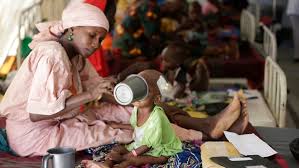
The World Food Programme (WFP) has warned that nearly 13.7 million people could face severe hunger by year’s end as cuts in humanitarian funding threaten six of its most critical operations. Programs in Afghanistan, the Democratic Republic of the Congo, Haiti, Somalia, South Sudan, and Sudan are already experiencing significant disruptions.
WFP Executive Director, Cindy McCain, warned that reduced rations mean more children will go hungry, more mothers will skip meals, and more families will lose essential support.
Globally, the number of people experiencing acute food insecurity has hit record levels. WFP estimates that 319 million people are currently in acute food insecurity, including 44 million at emergency levels.
In broader outlooks, WFP’s 2025 Global Outlook reports that as of November 2024, 343 million people were identified as acutely food insecure in 74 countries where WFP works and data is available.
The new WFP report, A Lifeline at Risk, warns that funding cuts could push millions of vulnerable people into deeper levels of crisis. The agency faces a projected 40 percent drop in funding, from US$10 billion in 2024 to US$6.4 billion in 2025.
The funding shortfall is most painful in regions already beset by conflict, climate shocks, displacement, and economic stress, factors that severely strain food systems. WFP also notes that nearly 70 percent of those facing acute food insecurity live in fragile or conflict-affected countries.
Unless urgent new financing is secured, the WFP warns, the cuts will jeopardize decades of progress against global hunger and deepen suffering in some of the world’s most vulnerable populations.



